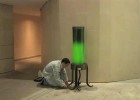Water Converts Wood Into Biofuel
Using water (supercritical water) to extract the sugars from parts of food crops that does not get eaten. Once the sugars are extracted they can be fermented into biofuel, which are largely ethanol.
Producing biofuel from food crops has been controversial, because it can raise the cost of corn and grain. But making the alternative fuel from the part of the food crop that doesn’t get eaten, such as the stalks, or from waste wood is expensive, as well as chemical- and energy-intensive. But a start up company called Renmatix, says it has an answer: Use supercritical water to extract the sugars.
Processes involving supercritical water has been used to decaffeinate coffee and in extracting hops to produce beer. Supercritical water is produced by heating ordinary water beyond its boiling point on a pressurized container.The water is in a state between being a liquid and a gas.
To produce biofuel, wood chips are place into a chamber with the supercritical water. This process breaks off some of the sugars, the ones with five carbon atoms, (Ordinary table sugar has 12 carbon atoms). The wood is then sent to another chamber to release the remaining sugars (which have six carbon atoms). Once the sugars are extracted, they are then fermented to produced biofuel. The biggest advantage of this process, is it does not need additional chemical treatments, which are expensive.




